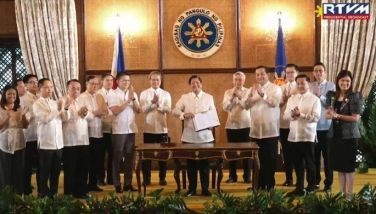What Marcos gave the world

Swiss anti-money laundering rules, Japanese protocols against corruption of aid they give, US policy vs supporting dictators. These are but a few of the global impact of the Marcoses’ plunder of unprecedented magnitude.
It needed the brilliance and audacity of former chief justice (CJ) Maria Lourdes Sereno for us to realize these sharp points during the Integrity Initiative’s forum on historical revisionism held this week. Or in Justice Sereno’s words, “historical denialism.”
Who would have thought that the Marcoses corrupted not only the taxpayers’ money and government contracts, but even the Japanese war reparation and aid money? Justice Sereno narrated that Swiss bank case accounts and records showed that 15 percent of remittances coming from Japan for war reparation and aid were deposited to their Swiss bank account. (News reports also carried that Japanese official development assistance (ODA) papers were left behind when the Marcoses fled in 1986.)
This Marcos scandal led Japan’s legislature to craft its 1992 ODA charter. As early as 1986, the scandal was nicknamed in Japan’s legislative session as the “Marcos Diet” (apparently referring to a greedy diet).
Because of the Marcos Swiss bank account scandals where aliases, fictional names or nominees were shown to have been tolerated by Swiss banking authorities, anti-money laundering rules were sanctioned for the first time. Whereas before they welcomed enormous sums of money, banks now take mandatory steps to ascertain the true owner of the funds before accepting deposits.
Along with changes in international banking standards, Justice Sereno also made us recall that this was pivotal in the change in US policy against supporting dictatorships.
The Integrity Forum elicited many impactful insights that ought to be shared. I only chose some this Sunday due to space limitation:
Justice Sereno
Before the rise of social media, the world had only one perspective on Marcos’ greed, the fall of the Philippine economy and the success of the People Power Revolution. Social media made it convenient to come up with different narratives such as Marcos did not steal, and there is nothing to steal because the country is poor.
We need to use the power of reason and dialogue, but we need to explain in layman’s terms to overcome the barrier of communication.
There should be a national conversation about the significance of people power to non-participants and to the rest of the country. News was centered only on personalities and people who flocked to EDSA (and not about the substance of what was fought for in the first place).
There is a lack of explanation why activism is needed. The only thing that was done was to project that activism is bad. The public was not educated enough that there are activists who are non-communists and non-NPAs. There are activists who are protective of human rights.
We need to explain to the people the economic and debt burdens left by Marcos and the economic decisions of the succeeding presidents.
John Nery, journalist
The state has a role in fostering historical denialism. Justice Sereno herself is a victim of historical denialism. In the Supreme Court’s website, she was airbrushed to disappear. After CJ Corona (2010–2012), it jumped to CJ De Castro (2018). What happened to 2012–2018 when CJ Sereno served?
There is an infrastructure of misinformation, where people actively fabricate stories. They believe that if you confuse people enough, truth does not matter anymore. What is at stake is the integrity of our history, the integrity of our nation.
Etta Rosales, activist
Worse than historical denialism is historical distortion. We need to speak in Filipino to be able to reach out regarding the truth. When you speak of traditional values, you have to relate it to human rights, and the effect on their families.
The youth should talk to their parents and tell their parents to care about their future when selecting leaders of the country.
Leloy Claudio, historian
We need to have a global perspective. Even if the world knows that Marcos is a violator and a thief, we are too parochial. We don’t care about what the world thinks. We should care. We should also have a broader narrative of facts. When people went to EDSA, this did not happen only in Manila. There were movements in Cebu and in Mindanao.
We must admit we have a moral problem. Those who believe in Marcos think it’s okay to kill. And this is also reflected in the present drug war. To quote Albert Camus, “All I ask is that in the midst of a murderous world, we agree to reflect on murder and to make a choice. After that, we can distinguish those who accept the consequences of being murderers themselves or the accomplices of murdered and those who refuse to do so with all their force and being. Since this dividing line does actually exist, it will be a gain if it is clearly marked.
* * *
To date, based on news reports, the Philippine government has recovered P174 billion out of the estimated P300 billion of Marcos’ ill-gotten wealth. To date, Marcos Jr. vigorously defends the wealth from existing lawsuits and attempts of the government to recover for the people. To date, no Marcos has been punished and Marcos Jr. seeks the presidency without remorse and without lack of supporters.
The Marcos crimes made the world shudder and reform. And what of the Philippines and the Filipinos, begging to be laughing stocks of the world again? Begging for a repeat of the “Golden Age” of corruption, deceit, cronyism and no accountability? It is on us. We cannot stop the lies, but we cannot fight it with the truth by lying down.
* * *
Atty. Alexander B. Cabrera is the chairman emeritus and ESG leader at Isla Lipana & Co./PwC Philippines. He is the chairman of the Integrity Initiative, Inc. (II, Inc.), a non-profit organization that promotes common ethical and acceptable integrity standards. Email your comments and questions to [email protected].
- Latest
- Trending































